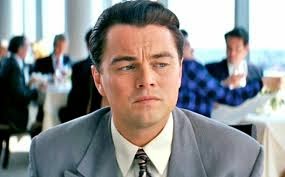CORRUPT OSCAR BAIT IN A COUNTRY OF OLD MEN
a review of Martin Scorsese's idiotic The Wolf of Wall Street
By Emma Judd
 |
| A Movie |
I hate the all too familiar critique, “Oh art is corrupt, look what it’s doing to the children! This is surely the end of the world.” It brings to mind old ladies with pursed lips, clutching their handbags to their sad old bosoms. Don’t they remember that they were once young and corrupt, too? Nonetheless, I am going to be that old lady and say unequivocally that Martin Scorsese’s The Wolf of Wall Street is about as corrupt and stupid a movie as three hour Oscar bait could ever be. Any way you look at it, Wolf is a failure of imagination and morals. It’s supposed bravo filmmaking is a joke when compared to the pre 9-11, Boiler Room, starring Vin Diesel, which outdistances Scorsese’s film merely be being decently written and morally and politically coherent.
Okay, let’s start at the beginning. Who is Jordan Belfort? And why is he worth my time or yours for that matter? Much less three hours of it? Belfort was involved in fraudulent stock schemes in the late nineties and has somehow managed to be the inspiration for these two contrary films—Boiler Room (2000), directed by Antoine Fuqua and The Wolf of Wall Street (2013), Scorsese’s contribution and based entirely on Belfort’s memoir. His experiences are carefully outlined in this three-hour movie. Belfort starts out a penniless, eager stockbroker at L.F. Rothschild, and ends up in jail. What people care about is the midpoint between the two, when he snorted two lifetimes of wealth up his nose and still had enough left over for yachts, hookers and elaborate parties. His rise to mountainous wealth occurred during the nineties where he started his own firm called Stratton Oakmont, in which his potential employees were only required to be as hungry for money as him, and to sit through his lesson on how to sell a pen (you must create a need for the pen).
 |
| Pensive little chap, isn't he? |
Scorsese conjures up the world of Jordan Belfort under the almost belief that we all covet such a lifestyle. As an audience, we are subject to drawn out scenes of tits, drugs, and rock & roll, which take up approximately 90% of the film—let’s call it character development by repetition. The few scenes that move the plot forward involve Belfort’s skills at misdirection while the FBI relentlessly pursues him. In Boiler Room, we follow a similarly ambitious and cunningly intelligent college dropout named Seth Davis (Giovanni Ribisi), whose place in the story is to the side of Belfort’s. He plays one of his aggressive stockbrokers. Here we come to the situation from a perspective that is infinitely more humble, curious and interactive, from an audience point of view. In Wolf we’re subject to a more voyeuristic approach and one that assumes that our concerns are either prurient (we love that stuff) or puritanical (we don’t). Scorsese clearly doesn’t believe we can think for ourselves or even want to try.
 |
| Life's good when it's a party |
Though Wolf is narrated by Belfort, his lack of empathy or curiosity (other than coke and the female body) leaves the audience uninvolved. The lack of distance doesn’t allow for any time to stop and assess what we’re seeing. Scorsese is afraid of letting us make any kind of moral or ethical judgments. And he should be, because in his world they don’t exist. There is a fundamental difference between presenting things as being crazy and allowing an audience to think about that craziness. The latter is where we practice ethics and judgment and the former is how a big time Hollywood director pretends to be thinking big thoughts.
Nothing in Wolf ever makes you stop, reflect and say, “I understand what I’m seeing.” What we’re seeing, in fact, is someone being seduced by greed. However, it’s an altogether better depiction of seduction when we actually see someone being seduced, as we do in Boiler Room. Seth’s love interest, Abbie (the lovely Nia Long in an excellent performance) makes no secret of her interest in him and their connection is inarguably smoldering. Still, Abbie has her own priorities, making her complex and admirable. She seems as if she’s alive. On the other hand, Scorsese’s female characters are nothing more than symbolic Playboy avatars for whatever stage of Belfort’s life he is descending into. Starting with his too good wife, then Nadine, a perfect Barbie doll of a model, as well as the thousands of faceless prostitutes, the women in Wolf are less animate than the wild fluctuations of the stock market itself. Without making a feminist critique, the flatness of the female characters is the smoke that signals the more dangerous fire around the corner: Scorsese’s frightening lack of perspective.
 |
| How strange, real people |
Apparently according to Scorsese, there is no one equal to Belfort, not his friends, not his wife, most likely not even him. Belfort is a hall of mirrors, and as a viewer we have no place to go, so we’re stuck, staring at Belfort, and he just stares back. In any film there’s a hierarchy of character, and minor characters, when concretely presented give us access to other perspectives. It’s what makes a story interesting and multi-faceted. Through them, we can experience both solidarity and an appreciation of the complexity of a situation. There is never one side to anything, and understanding that is what divides a thoughtful film from a mindless experience with pretty colors and a splashy cast.
The most memorable scene with Nadine, his wife, involves her spreading her legs before her husband while tauntingly telling him that he should get one last good look. Her manner is confident, her voice unwaveringly sultry, affirming what many seem to want to believe, that pussy rules all (not just any pussy though, so impossibly perfect we couldn’t even show it, Nadine pussy), but one can’t help but note the desperation in the act itself. I couldn’t help but feel that the whole thing was a silly joke: is it really possible that Belfort is that taken with the sight of his ex-wife’s snatch? It’s certainly not an honest or smart representation of what it really felt like to be Belfort. This is just Scorsese’s lame depiction of depravity, an old man’s notion of perversity.
 |
| Old man perversity |
In this way, Wolf seems not to be the satire it claims to be, but a desperate attempt for attention and a product of its own critique. In an attempt to scream louder than Youtube and Facebook ads, Wolf is little more than an ad itself, a commercial for a so-called artistic seriousness that it doesn’t possess. The real Belfort’s web page is currently divided in two, the trailer for Wolf plastered on one side, and on the other an add for Belfort’s program claiming he can teach anyone to be a great salesman—using the movie as proof! You might say the joke is on Belfort, until you realize that the joke is probably on Scorsese. It feels like one of those ad pages that pop up for porn sites. How did Scorsese manage to stoop so low as to allow his movie to be a drawn out infomercial for this despicable person? The tag team of movie director as commercial representative for entrepreneurial swindler has a rotten stench to it, and Scorsese lack of imagination and contempt for the audience is dead center in the scheme.
Belfort is an example of someone who chose riches over love, scruples or morality and, sadly, it didn’t end too badly for him. Wolf helps us learn how to really throw a party and that’s about it. It’s as if the film wants to make you feel like a failure for not even trying to aspire to Belfort’s level of corruption. I can’t think of a more shallow piece of capitalist propaganda: the “coming soon” poster features Leonardo Decaprio (reminiscent of the Obama illustration), reaching for the heavens with the words, “earn, spend, money” scrawled over his body. Is it meant to be ironic? Does it matter?
 |
| One of the founding fathers? |
Wolf celebrates the greatest right of the American people: to make a ton of money at the expense of anything you could possibly name. Scorsese’s flat and monotonous three-hour celebration of Belfort has no aesthetic or intellectual force. Only once does the film even try to relate what he actually did or tried to do. The explanation is quickly dismissed with a flippant, patronizing chuckle. Scorsese is clearly saying that one, the audience couldn’t possibly be interested; and two, they’re too stupid to understand anyway. No, Scorsese and Belfort are positive that we only want to watch rich people party and maybe get rich ourselves—I guess if reality T.V. is any indication, they’re probably right. In comparison, Boiler Room assumes that we’re smart enough to understand embezzlement and care about what that means to our lives. It appears that intelligence and empathy are not part of Scorsese’s vision.
If you look up Belfort’s image on Google, you’ll find a cross-eyed picture of a Jersey boy standing beside a girl with a tuft of sandy blonde hair carefully combed over her face—it’s so posed that it dips into comedy. This is not an adult; this is a child, who along with countless other children, managed to rule the world for almost a decade and now Scorsese wants us to mindlessly worship his energy? Moxie? American Story? It’s obscene. If I sound resentful, I am. Wolf is long, dumb and unworthy of even ten minutes of your attention.
 |
| Watching this movie is time destroyed |
©Emma Judd and the CCA Arts Review

No comments:
Post a Comment